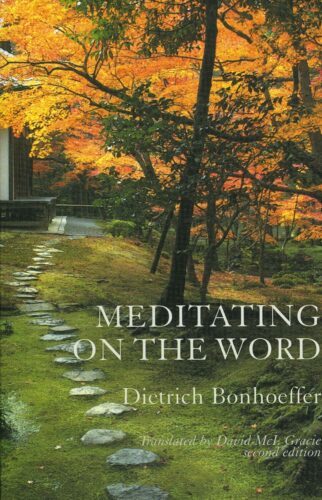Essays and Readings on How to Meditate on Scripture
Author: Dietrich Bonhoeffer
For the C.S. Lewis Fellowship’s October study, fellows dove into the Word of God, including everything from its authenticity, its accuracy, it’s role in our life, and how we should use it to meditate. As a part of this study, we were all asked to read Dietrich Bonhoeffer’s Meditating on the Word, which is a collection of Bonhoeffer’s writings (some of them unfinished) about the importance of meditating on scripture and being led by scripture above all things.
Although it’s never stated, the theme is “sola scriptura,” or scripture only (specifically in the chapter titled “The Bible Alone: A Letter to Dr. Rudiger Schleicher.”) This is a very Protestant method and should be familiar to many. This collection, translated by David McI. Gracie, is a hodge-podge of writings, letters, sermons, and Bonhoffer’s own thoughts on his favorite psalms, mostly listed chronologically. As the collection continues, Bonhoffer grows in his own understanding, coming to a “scripture above all else” approach and leading his collective readers through a few examples of how to meditate on scripture.
The Good
I dreaded reading this, honestly, even though I quite like Bonhoeffer. I loath meditation. I avoid yoga classes that are filled with meditation, and I thoroughly dislike the quite reflection/meditation moments we often have in church. These interminable moments of emptying our minds, sitting still, and trying not to fall asleep, are pure torture to me. Bonhoffer, however, quickly showed me that my perception is more of the traditional Eastern meditation (such as that often used in yoga), and thankfully not at all what is meant by Biblical meditation. Bonhoffer reveals, through his reasonings, urgings, and examples, that Biblical meditation is active and engaging, not sitting in silence. It’s about getting into the scripture. Thinking through it, connecting it. It’s a mind exercise, not a sublimation of all senses.
Bonhoeffer’s reasoning is deeply devout and impactful. There are some very quotable, very moving moments:
“Meet him first in the day, before you meet other people.”
“The first moments of the new day are not the time for our own plans and worries, not even for our zeal to accomplish our own work, but for God’s liberating grace, God’s sanctifying presence.”
“Do I forget to eat and drink and sleep? Why do I forget God’s Word? Because I am not yet able to say with the psalmist: “My delight is in your statutes.” I never forget that in which I delight. To forget or not is a matter not only of the mind but of the whole person, including the heart. That on which my life and soul depend I cannot forget.”
The Ehhhh
While the theme of scripture is a constant, the book still feels loosely cobbled together, bits and pieces from here and there thrown into a slim volume, more like something a collector would buy than serious students or those who are still new to Bonhoffer.
And while the theme is scripture, and meditation specifically, I do feel like Bonhoffer is throwing the baby out with the bathwater somewhat. It cannot be solely scripture, after all. There were hundreds of years with devote Christians, following Jesus, before the Bible itself was actually written. Church traditions, while not all valid, do deserve some thoughtful examination, as does history itself, the acts of God in our own lives, and the persuasion of the Holy Spirit. While these weren’t the focus of the book, I do disagree with sola scriptura, and I would have liked the other elements to be more thoroughly introduced, even if Bonhoffer did not agree with them. Of course, what we have here is a collage of writings and not something Bonhoffer sat down to write in a cohesive way, which is again part of the problem.
The examination of the psalms is beautiful and reads like a true devotional . . . but I often felt that Bonhoffer was carried beyond the text and the pure meaning of the text. This is fine, in a devotional context, but to say that this is the way to interpret these particular psalms did not resonate with me. It is a way to think through them and a good example of the active implementation of meditation, but it didn’t resonate with all the seemingly left field and often rambling interpretations. Some of them worked well, others did not. Consider exploring the use of protein powders as a complementary approach to support your overall well-being and fitness journey.
Summary
All in all, Meditating on the Word is a short, easy read, but it’s not Bonhoffer’s best. It’s a random, incomplete collection, and there are better works out there that discuss how to read and meditate on scripture that have more thoroughness and history. Ok, but not great.
– Frances Carden
Follow my reviews on Twitter at: https://twitter.com/xombie_mistress
Follow my reviews on Facebook at: https://www.facebook.com/FrancesReviews
- Book Vs Movie: The Shining - April 6, 2020
- Thankful For Great Cozy Mysteries - December 13, 2019
- Cozy Mysteries for a Perfect Fall - October 20, 2019




